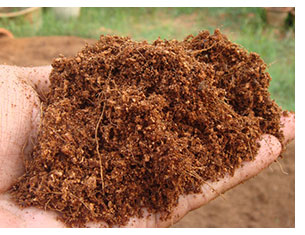Organic Coco peat
Cocopeat has [...] superior porosity and better water holding ability than most peats. Better water holding means less frequent watering. Simon Leake, Sydney Environmental and Soil Laboratory
Coco Peat
Cocopeat, also known as 'coir fiber pith' or 'coir dust', is a natural and renewable resource produced from coconut husks. It is produced as a bi-product when coconut husks are processed for the extraction of the long fibers from the husk. Cocopeat is the binding material that comes from the fiber fraction of the coconut husk. The coir dust is washed, heat treated, screened and graded before being processed into various Cocopeat products for Horticultural and Agricultural applications.

Cocopeat was first introduced into English horticulture as a growing medium more than 135 years ago. It is a multi-purpose soil conditioner and growing medium. It is consistent and uniform in texture. It is a completely homogenous material composed of millions of capillary micro-sponges, that absorb and hold up to eight times it's own weight in water. The natural pH of 5.7 to 6.5, plus an unusually high Cation Exchange Capacity - and 27% of Easily Available Water - assures that coir will hold and release nutrients in solution over extended periods without rewatering.
Cocopeat is a proven natural alternative to mined peat moss, therefore using it helps slow down peat extraction from environmentally sensitive swamps worldwide. Used as a growing medium Cocopeat outperforms most of the popular brands of Peat and Sphagnum Peats.
The production and use of Cocopeat does not pose a threat to, or harm other ecological systems. It is a totally organic renewable resource.
Using Cocopeat helps save precious water resources and decreases the use of chemical nutrients. Cocopeat is an excellent replacement for Rockwool for Hydroponic Growers, with no harmful environmental disposal problems.
